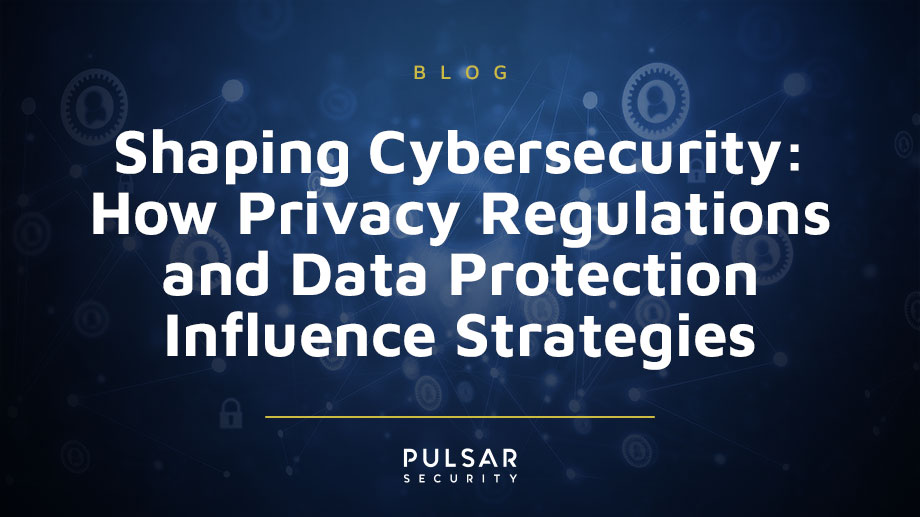Shaping Cybersecurity: How Privacy Regulations and Data Protection Influence Strategies
The importance of privacy regulations and data protection in an increasingly interconnected digital world cannot be overstated. They serve as the bedrock of our digital society, shaping how we interact, transact, and communicate. As organizations continue to embrace digital transformation, the volume of personal and sensitive data being generated is staggering. This surge in data creation necessitates robust privacy regulations and stringent data protection measures.
Meanwhile, the growing focus on privacy regulations and data protection profoundly influences organizations’ cybersecurity strategies. Consequently, it is vital to comprehend the effects of regulations like the General Data Protection Regulation (GDPR), the California Consumer Privacy Act (CCPA), and forthcoming privacy laws. Furthermore, understanding the compliance hurdles businesses encounter and the pivotal role of privacy in cybersecurity is essential as it guides the most effective methods for ensuring compliance.
The GDPR and Its Impact on Cybersecurity Strategies
The GDPR, implemented by the European Union in 2018, has significantly influenced cybersecurity tactics globally. The regulation is designed to safeguard digital data transferred outside of Europe, focusing on the security of users’ digital data and protecting their data across various digital platforms.
Under the GDPR, businesses are required to maintain the integrity and confidentiality of the personal data they manage. The regulation compels organizations that handle and process data of EU citizens to adopt advanced security technologies and procedures, such as pseudonymization, encryption, and regular testing. It also requires businesses to have a legal basis for data processing activities.
Moreover, failure to comply with the GDPR can lead to hefty fines and penalties. The maximum penalty a company can incur is 4% of its annual global turnover, or €20 million, whichever is greater. Lesser violations like maintaining improper records or failing to report breaches can result in a company being fined up to 2% of its annual global turnover, or €10 million, whichever is greater.
The GDPR has extensive implications for businesses, influencing how they manage personal data, the compliance measures they need to implement, and the penalties they could incur for non-compliance. Therefore, businesses must fully comprehend these implications and take the necessary measures to ensure proper compliance.
The CCPA And How It Has Redefined Cybersecurity
The California Consumer Privacy Act (CCPA), enacted in 2020, has reshaped cybersecurity approaches. This all-encompassing data protection legislation has revolutionized how companies manage personal data. It empowers individuals to ask for the removal of their details, disclosure of data categories, and identification of third parties to whom the data is sold or revealed.
The CCPA mandates that companies must protect the integrity and privacy of the personal data they manage. It also necessitates that companies have a lawful basis for their data processing operations. The CCPA specifically promotes data reduction practices, encouraging companies to ensure they are only gathering and utilizing the necessary data. This is done to enhance data security and privacy measures while reducing the impact of data breaches.
The Act applies to all profit-oriented businesses operating in California that meet any of the following conditions: they have annual gross revenues exceeding $25 million, they collect personal information of more than 50,000 California residents, households, or devices, or they derive at least 50% of their annual revenue from selling personal information.
Failure to comply with the CCPA can lead to significant fines and penalties. The maximum penalty a company can face is $2,500 per violation for unintentional violations and $7,500 per violation for intentional violations. This implies that each violation incurs a separate penalty, which is a costly risk for businesses that must comply with the CCPA.
Other privacy laws in the US
- The Montana Consumer Data Privacy Act (MTCDPA), established on May 19, 2023, and set to become effective on October 1, 2024, applies to businesses that manage the personal data of a minimum of 50,000 Montana residents. Its main objective is to protect personal data. This legislation allows consumers to verify whether a business is processing their personal data or accessing it, and allows for data removal requests.
- The Oregon Consumer Privacy Act (OCPA), which will be effective July 1, 2024, applies to businesses that operate in Oregon or offer products or services to residents of Oregon. It gives consumers the right to access and delete their data and opt out of companies that sell or use it for targeted advertising.
- The Texas Data Privacy and Security Act (TDPSA), enacted into law on June 18, 2023, applies to entities that do business in Texas or produce products or services that are “consumed” by residents of Texas. This law enables consumers to verify whether a controller is processing personal data, access it, correct any inaccuracies, delete personal data, obtain a copy of their personal data, and opt out of personal data processing for targeted advertising.
The Role of Privacy in Cybersecurity and Compliance Challenges
Privacy is a foundational element of cybersecurity. It plays a critical role in maintaining trust and ensuring the confidentiality of personal information. In the current digital age, where data is constantly shared, collected, and analyzed, protecting privacy has become more critical as cybercriminals have stepped up their capabilities and methods for stealing it.
Data privacy focuses on protecting personal information from unauthorized access and use. Subsequently, all data privacy regulations require businesses to implement various data protection measures to effectively mitigate the risk of data breaches and safeguard sensitive data from cyber threats.
As these regulations evolve, businesses must stay abreast of the changes and adapt their strategies to ensure robust data protection and compliance. However, ensuring cybersecurity compliance can be cumbersome. Multiple regulatory bodies and private industry groups impose hundreds of controls and numerous requirements, and meeting all these requirements is an uphill task for most businesses.
Organizations face challenges in keeping up with the rapidly changing threat landscape and the increasing sophistication and frequency of cyberattacks. Moreover, the rapid evolution of technology adds to the complexity of maintaining robust cybersecurity measures and ensuring compliance with current and emerging regulations.
Navigating Compliance Challenges
Navigating the compliance challenges of privacy regulations and data protection laws requires a multi-faceted approach. Here are some strategies that businesses can adopt:
1. Regular Audits and Assessments
Regular audits and assessments are crucial for ensuring compliance with privacy regulations. These audits help businesses identify gaps in their data protection measures and take corrective actions. They also provide insights into the effectiveness of the existing cybersecurity strategies and suggest areas for improvement.
2. Employee Training and Awareness
Employee training and awareness programs are vital in ensuring data protection and privacy. Employees should be trained on the importance of data privacy, the potential risks of data breaches, and the best practices for data protection. Regular awareness sessions can help inculcate a culture of data privacy within the organization.
3. Leveraging Technology
Technology can be leveraged to ensure robust data protection and compliance with privacy regulations. This includes using encryption for data protection, implementing secure access controls, and using advanced analytics for threat detection.
4. Policy Development and Implementation
Developing and implementing comprehensive data protection policies is crucial in ensuring compliance with privacy regulations. These policies should clearly define how personal data should be handled, stored, and shared within the organization and outline the procedures to be followed in the event of a data breach.
5. Data Mapping
Data mapping involves identifying, understanding, and tracking the personal data that an organization collects, processes, and stores. This can help businesses understand their data flows, identify potential vulnerabilities, and take necessary measures to protect sensitive information. Data mapping can also assist in responding to data subject requests, which is a key requirement under many privacy regulations.
6. Vendor Management
Businesses often share personal data with third-party vendors, which can pose significant compliance risks. Implementing robust vendor management practices can help mitigate these risks. This includes conducting due diligence before sharing personal data with vendors, incorporating data protection clauses in vendor contracts, and regularly auditing vendors for compliance.
Partnering with experts
Partnering with experts can provide invaluable guidance in the complex landscape of privacy regulations and cybersecurity. Companies like Pulsar Security specialize in helping businesses navigate these challenges. Their expertise in cybersecurity ensures that they can assist SMEs and corporations in staying abreast of the latest developments in privacy regulations and adapting their cybersecurity strategies accordingly.
Technology is crucial in ensuring robust data protection and compliance with privacy regulations. Pulsar Security offers advanced cybersecurity solutions that can be leveraged to protect data, implement secure access controls, and detect threats.
The Future of Privacy Regulations and Cybersecurity
The future of privacy regulations for businesses will likely be characterized by increased scrutiny and stricter enforcement. As data breaches and privacy concerns continue to make headlines, a growing demand for more robust data protection laws is growing. Businesses can expect to see more comprehensive and stringent regulations being introduced at the national and international levels.
These regulations will likely cover new areas, such as artificial intelligence and machine learning, and impose stricter penalties for non-compliance. Consequently, businesses will need to invest more in their data privacy and security measures and ensure robust compliance programs are in place.
Partnering with a cybersecurity firm like Pulsar Security can help businesses turn the challenge of privacy regulations into a competitive advantage. By leveraging their expertise and solutions, companies can ensure robust data protection and compliance, building trust with their customers and stakeholders.

Peyton Somerville
Peyton is a Security Engineer at Pulsar Security. He is the technical contact for our customers - managing all Cyber Shield Vulnerability and Dark Web Assessments, and is on the Red Team. He has software development experience with Python, JavaScript, C, C++. He has earned his Offensive Security Certified Professional (OSCP), Network+ and Security+ certifications. Peyton first started with Pulsar as a intern while attending the University of Massachusetts - Lowell as a Computer Science major. He now leads the Pulsar Explore Internship Program ensuring all interns engage in hands-on learning, interactive mentorship, and learn about cyber career opportunities. Fun Fact: Peyton loves to snowboard, and even knows how to juggle.




